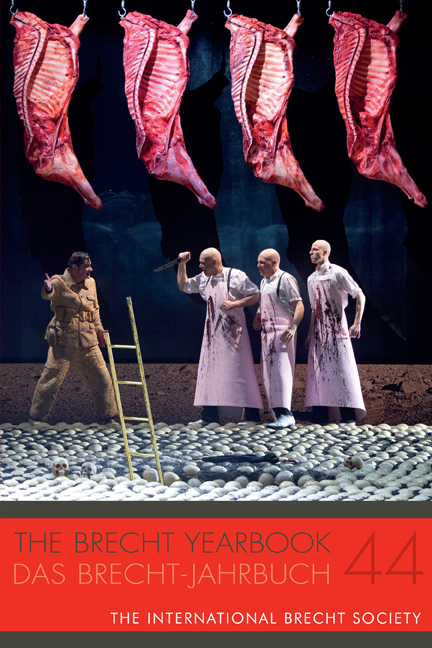Book contents
- Frontmatter
- Officers of the International Brecht Society
- Contents
- Editorial
- List of Abbreviations
- Brecht, Günter Kunert, and Edgar Lee Masters
- Brecht’s Dramatic Fragments
- Pure Joke: The Comedy of Theater since Brecht
- New Brecht Research
- Book Reviews
- Notes on the Contributors
- Now at De Gruyter Exilforschung Ein Internationales Jahrbuch
Marvin Carlson. Shattering Hamlet’s Mirror: Theatre and Reality
Published online by Cambridge University Press: 09 February 2021
- Frontmatter
- Officers of the International Brecht Society
- Contents
- Editorial
- List of Abbreviations
- Brecht, Günter Kunert, and Edgar Lee Masters
- Brecht’s Dramatic Fragments
- Pure Joke: The Comedy of Theater since Brecht
- New Brecht Research
- Book Reviews
- Notes on the Contributors
- Now at De Gruyter Exilforschung Ein Internationales Jahrbuch
Summary
It is an interesting experiment to read Shattering Hamlet's Mirror side-byside with Carlson's important earlier Performance: A Critical Introduction (1996), published twenty years before. Both trace crucial watersheds regarding the status of theater and performance; the earlier book marked the history of the performative turn that radically distinguished performance as an intervention into reality in contrast to the theater that depended on the conjuring of an illusion separate from such reality. This divide in its various well-established iterations of text and performance, the dramatic and postdramatic, or the actor versus the performer, continues to influence current theatrical debates and ultimately impacts our conceptions of reality. In turn, what is maybe most remarkable about the later book, Shattering Hamlet's Mirror, is the fact that it is governed by a willingness to undermine these distinctions and instead stresses the continuities across history in theater's struggle with the real; or, as Marvin Carlson formulates it with the help of Bert States, it explores the dynamic of “devouring the real in its realest forms” (15). On a very fundamental level then, the book posits the question of how reality enters the stage while also focusing on theater's materiality as uniquely able to accommodate real objects in its processes of production (104). It is a further credit to Carlson's unwavering intuition for the latest developments in theatrical expression that he has embarked on an analysis of (mostly) Western theater's hunger for the real in its various forms, since reality and realism—long shunned as outmoded in academic discourse— have returned with a fresh urgency to the current theatrical debates. Thomas Ostermeier's call for a “new realism” at the beginning of his tenure as the Artistic Director of Berlin's Schaubühne am Lehniner Platz in 1999 speaks to this fact as much as Swiss director Milo Rau publishing his aesthetic treatise Global Realism (2018) on the occasion of his taking over the Nederlands Toneel Ghent. In the US context, the hyperrealist aesthetic of Richard Nelson's The Apple Family Plays (2010–13) and the trilogy The Gabriels (2016) offer a further case in point. The reason for such a preoccupation with the real is, first of all, political: it is a response to the muchtouted crisis of democracy in the face of neoliberal globalization strategies, as the work by Ostermeier, Rau, and Nelson can attest to.
- Type
- Chapter
- Information
- The Brecht Yearbook / Das Brecht-Jahrbuch 44 , pp. 245 - 248Publisher: Boydell & BrewerPrint publication year: 2019



